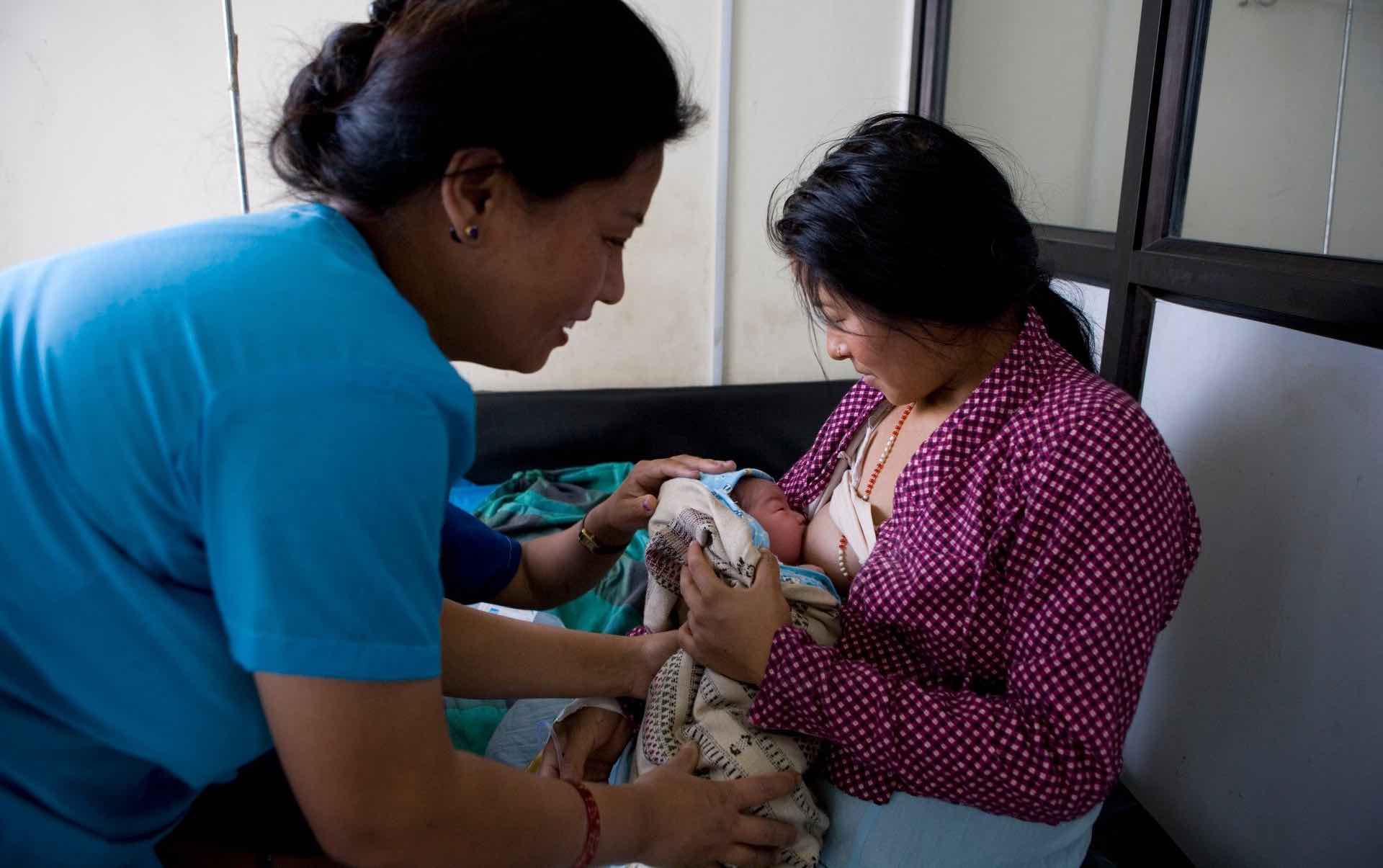World Breastfeeding Week (August 1-7) promotes a universal practice that has multiple short- and long-term benefits for children, mothers, and for public health in general. Yet too many mothers around the world, in low-, middle-, and high-income countries alike, face numerous challenges to breastfeeding their babies. We asked IFPRI researchers Purnima Menon, Sunny Kim, and Phuong Hong Nguyen to talk about the benefits of breastfeeding and insights from IFPRI research and other recent scientific findings on how to improve programs and policies to support breastfeeding.
Q: We often hear about the benefits of exclusive breastfeeding for the first six months of a baby’s life. Can you elaborate on the reasons behind this recommendation? What are some of the latest findings from research on the long-term health outcomes of breastfeeding?
A: Infants and young children are most likely to survive, grow, and develop to their full potential when breastfed. Despite the clear scientific evidence for these outcomes, breastfeeding is still not practiced enough, with only one in two newborns being put to the breast within the first hour of life and fewer than half of infants under 6 months old being exclusively breastfed. Sub-optimal breastfeeding practices contribute to 11.6% of mortality in children under 5 years of age. About $341.3 billion per year is lost globally because of inadequate investment in protecting, promoting, and supporting breastfeeding.
The World Health Organization recommends breastfeeding exclusively for the first 6 months and continued breastfeeding for at least the first 2 years of life because of the many benefits to health and human development. The recent Lancet Breastfeeding 2023 series has updated long-term health outcomes of breastfeeding, including promoting healthy brain development; helping to prevent the triple burden of malnutrition (undernutrition, micronutrient deficiencies, and overnutrition) and reducing associated infectious diseases and mortality, as well as lowering the risk of obesity and chronic diseases in later life. Breastfeeding also supports birth spacing and helps to protect the mother against chronic diseases, including breast and ovarian cancers, type 2 diabetes, and cardiovascular disease.
Breastfeeding rates can vary significantly across different regions and communities. What are some of the effective approaches for promoting breastfeeding and increasing awareness about its benefits? What good examples have you seen through your work?
There are multiple effective approaches to promoting breastfeeding and increasing awareness about its benefits at different levels. In the workplace, key interventions are paid maternity leave, equitable working conditions for breastfeeding mothers, and parental support policies and practices. Within health systems, key interventions include early skin-to-skin care, kangaroo mother care (mothers carry infants with them) and rooming in (newborns stay with mothers instead of going to a nursery). Community-based interventions include building capacity for health care providers and community health workers, and engaging family members such as fathers and grandmothers to support breastfeeding practice. Systematic reviews have documented the impact on breastfeeding practices based on the use of individual-and group-based peer counseling and contact with lay counselors or trained personnel. Another review provides evidence that combinations of interventions delivered through different platforms are more effective than single interventions, and recommends combined strategies using complex adaptive systems for scaling up. Evidence from the Alive & Thrive project shows that comprehensive behavior change strategies implemented at scale, under real life conditions, and delivered through outreach (Bangladesh) and facility-based (Viet Nam) platforms have strong and significant impacts on breastfeeding practices. Strategies that combine intensive interpersonal counseling accompanied with mass media, community mobilization, and advocacy to create enabling policies are more effective than standard counseling along with less-intensive accompanying strategies.
As nutrition researchers, what do you believe are the most critical areas for further research regarding breastfeeding and its impacts on public health?
One of the most critical areas for further research is examining the potential of multi-pronged, coordinated approaches that link policy advocacy, programming support from governments and health organizations, healthcare systems, and family and individual education support. Even though we have studied these types of efforts in some settings, more evidence is needed, especially in changing contexts. Research is also needed on improving programs and policies to regulate the rampant marketing of breast milk substitutes such as infant formula. Last but not least, research on enabling policies such as maternity leave, maternity cash benefits, and other supportive measures can help countries make better investments.
Are there any misconceptions or myths about breastfeeding that you would like to debunk based on scientific evidence?
In many low-and middle-income countries, mothers are being insidiously and persistently targeted online or in person by aggressive infant formula marketing. They are led to believe that infant formula is better and more convenient than breast milk, and many start to feed their babies infant formula very early, and in many cases use it to replace breast milk entirely. It is the time to stop aggressive promotion of commercial milk formula for babies and young children because it can discourage breastfeeding, undermines mothers’ confidence, and poses several risks to the health of infants and children.
As we mark World Breastfeeding Week, what message would you like to convey to policymakers, healthcare providers, and the general public about the importance of breastfeeding and the need for continued research in this field?
The evidence is clear that breastfeeding has numerous benefits for infants, mothers, and societies. Supportive programs, policies, and investments are needed across society to enable women to breastfeed their babies, but such efforts are often actively thwarted by commercial forces. There is much need for continued research in understanding how to tailor, deliver, and finance effective strategies in changing contexts to ensure that this critical “first food” is available to all babies around the world.
Purnima Menon is Senior Director, Food and Nutrition Policy, CGIAR and IFPRI; Sunny Kim is a Research Fellow with IFPRI’s Nutrition, Diets, and Health (NDH) Unit; Phuong Hong Nguyen is an NDH Senior Research Fellow.







